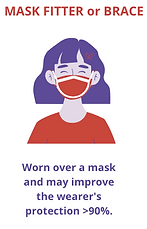COVID-19 Tips And Tricks
If you aren't able to double mask, knotting and tucking a medical mask can also help reduce exposure.
Double Masking and Other Mask Modifications

The CDC recently published a study about the ways that mask modifications can decrease COVID-19 exposure. Double masking, and knotting and tucking a mask were found to be particularly helpful in decreasing the transmission of COVID-19. While most studies have focused on how wearing a mask helps reduce the transmission of COVID-19 to others, this study shows that mask modifications can reduce COVID-19 exposure for everyone, including the person wearing the mask.
Double masking: layering a cloth mask on top of a medical procedure mask in order to decrease the transmission of COVID-19.
Medical masks generally provide better protection than cloth masks, but have a looser fit, which increases the potential for exposure. This problem can be solved by combining a medical mask and a cloth mask.



1. Knot the ear loops of the mask where they attach to the edge of the mask's
To properly knot and tuck a medical procedure mask:
2. Tuck in and flatten the extra material close to the face.
Other effective options include:
Knotting and tucking can decrease the mask wearer's COVID-19 exposure by 77%.
SOURCES:


The New Strains of COVID-19
Since December, at least three new strains of COVID-19 have been found in California. One variant, B.1.1.7, is 30-70% more contagious and has been detected in at least ten states in the US. If these strains were to spread uncontrolled, it could be disastrous for San Francisco and the country. A virus that is even 50% more transmissible could cause cases to double in less than two weeks, and could lead to 4-5 times as many cases within a month.
What you can do to help slow the spread:
1. Stop going to the grocery store.
Services like Instacart allow you to have food from grocery stores delivered directly to your home. Stores like Safeway and Target also offer cost-free curbside grocery pickup.
If you need to go to the grocery store, plan ahead so you can limit the time you spend in the store. Spending five minutes in a grocery store is six times safer than spending half an hour inside.
2. Avoid all indoor activities with individuals outside of your household.
Studies show that the risk of transmission is 20x higher in indoor settings compared to outdoor settings. Completely avoid indoor gatherings with individuals outside of your household. If you are missing someone, video calling is a great alternative!
3. Get a better mask!
While Americans continue to rely primarily on cloth face masks, countries like Austria has been distributing N95-level masks, which are much more effective, to all citizens over 65.

SOURCES:
Mental Health Tips
As we enter the new year in quarantine, some of us might be struggling. Here are some tips for taking care of yourself this year. No one thing works for everyone, so do what feels right for YOU. Remember, if you are struggling it's okay to seek help from a professional.
Take a media break.
As we social distance from our friends and loved ones, our phones can start to feel like extensions of our hands. The constant stream of information from the media can be overwhelming.
Staying connected and informed is important, but only in moderation!
Studies have shown limiting media time can decrease loneliness, depression, and anxiety, and improve self-esteem. Try setting a time limit for yourself, or scheduling social media breaks.
Have a plan if you feel sick.
1. Know the symptoms of COVID-19.
-
Fever or chills
-
Cough
-
Difficulty breathing
-
Fatigue
-
Muscle or body aches
-
Headache
-
Loss of taste or smell
-
Sore throat
-
Congestion or runny nose
-
Nausea, vomiting or diarrhea
2. Know what to do if you have symptoms.
a. Get tested for COVID-19
b. Self-quarantine until you have a negative test
c. Monitor your symptoms
d. If your symptoms get worse, call your healthcare provider immediately.
e. Stay hydrated and rest
f. Quarantine away from people you live with. If possible, use a separate bathroom. If you need to leave the room wear a mask.
Create a routine.
Having a routine can help reduce stress, anxiety, insomnia, and more. Routines can help you make time for things you enjoy doing!
Start by making a list of things you normally do throughout the week. Set yourself up for success by making the routine realistic. For example, if you tend to stay up late, don't plan to get up at 8am.

Take care of you.
The stress of the pandemic can make self-care hard, but taking care of yourself physically will improve your mental health.

Simple ways to take care of your body:
-
Drink water
-
Eat regularly
-
Move your body! Take a daily walk, create a workout routine, or stretch every morning to get your body moving.
-
Remember to take your medicine. If you have mental or physical health problems, it's important to take the medicine that helps. Setting reminders on your phone or computer can help!
Be compassionate with yourself. There is so much going on in the world right now and it's okay feel overwhelmed. We have never been through something like this before. BE GENTLE with yourself. You're doing your best, and wherever you are in your life right now is okay.
Take time to reflect on how you're feeling. If you are struggling to feel like yourself, remember that it's okay to reach out for support!
Make time for things you enjoy! Having a hobby or creative outlet reduces stress, helps settle emotions, and can help bring joy into your daily routine! Whether it's reading a book, woodworking, making music, knitting, drawing, writing, or yoga, make time in your day for the things you enjoy.
San Francisco Mental Health Resources:
24hr Suicide Prevention Talkline: 415-781-0500
Other SF mental health resources: www.mhbsf.org/resources/
SOURCES:





